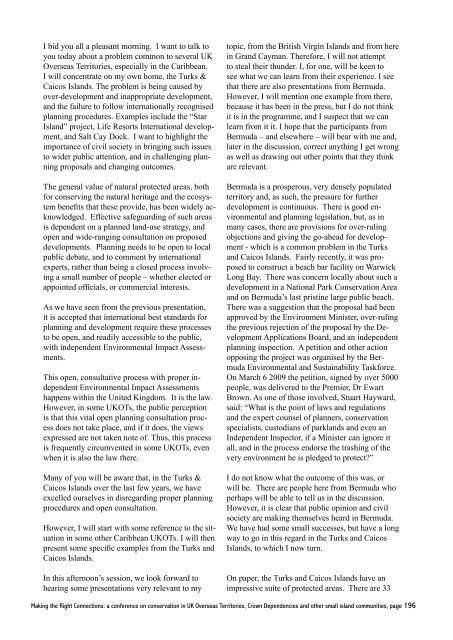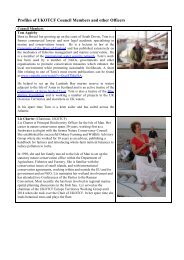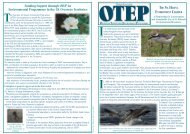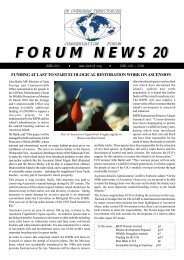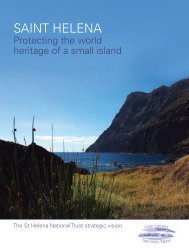Section 06 - UKOTCF
Section 06 - UKOTCF
Section 06 - UKOTCF
You also want an ePaper? Increase the reach of your titles
YUMPU automatically turns print PDFs into web optimized ePapers that Google loves.
I bid you all a pleasant morning. I want to talk to<br />
you today about a problem common to several UK<br />
Overseas Territories, especially in the Caribbean.<br />
I will concentrate on my own home, the Turks &<br />
Caicos Islands. The problem is being caused by<br />
over-development and inappropriate development,<br />
and the failure to follow internationally recognised<br />
planning procedures. Examples include the “Star<br />
Island” project, Life Resorts International development,<br />
and Salt Cay Dock. I want to highlight the<br />
importance of civil society in bringing such issues<br />
to wider public attention, and in challenging planning<br />
proposals and changing outcomes.<br />
The general value of natural protected areas, both<br />
for conserving the natural heritage and the ecosystem<br />
benefits that these provide, has been widely acknowledged.<br />
Effective safeguarding of such areas<br />
is dependent on a planned land-use strategy, and<br />
open and wide-ranging consultation on proposed<br />
developments. Planning needs to be open to local<br />
public debate, and to comment by international<br />
experts, rather than being a closed process involving<br />
a small number of people – whether elected or<br />
appointed officials, or commercial interests.<br />
As we have seen from the previous presentation,<br />
it is accepted that international best standards for<br />
planning and development require these processes<br />
to be open, and readily accessible to the public,<br />
with independent Environmental Impact Assessments.<br />
This open, consultative process with proper independent<br />
Environmental Impact Assessments<br />
happens within the United Kingdom. It is the law.<br />
However, in some UKOTs, the public perception<br />
is that this vital open planning consultation process<br />
does not take place, and if it does, the views<br />
expressed are not taken note of. Thus, this process<br />
is frequently circumvented in some UKOTs, even<br />
when it is also the law there.<br />
Many of you will be aware that, in the Turks &<br />
Caicos Islands over the last few years, we have<br />
excelled ourselves in disregarding proper planning<br />
procedures and open consultation.<br />
However, I will start with some reference to the situation<br />
in some other Caribbean UKOTs. I will then<br />
present some specific examples from the Turks and<br />
Caicos Islands.<br />
In this afternoon’s session, we look forward to<br />
hearing some presentations very relevant to my<br />
topic, from the British Virgin Islands and from here<br />
in Grand Cayman. Therefore, I will not attempt<br />
to steal their thunder. I, for one, will be keen to<br />
see what we can learn from their experience. I see<br />
that there are also presentations from Bermuda.<br />
However, I will mention one example from there,<br />
because it has been in the press, but I do not think<br />
it is in the programme, and I suspect that we can<br />
learn from it it. I hope that the participants from<br />
Bermuda – and elsewhere – will bear with me and,<br />
later in the discussion, correct anything I get wrong<br />
as well as drawing out other points that they think<br />
are relevant.<br />
Bermuda is a prosperous, very densely populated<br />
territory and, as such, the pressure for further<br />
development is continuous. There is good environmental<br />
and planning legislation, but, as in<br />
many cases, there are provisions for over-ruling<br />
objections and giving the go-ahead for development<br />
- which is a common problem in the Turks<br />
and Caicos Islands. Fairly recently, it was proposed<br />
to construct a beach bar facility on Warwick<br />
Long Bay. There was concern locally about such a<br />
development in a National Park Conservation Area<br />
and on Bermuda’s last pristine large public beach.<br />
There was a suggestion that the proposal had been<br />
approved by the Environment Minister, over-ruling<br />
the previous rejection of the proposal by the Development<br />
Applications Board, and an independent<br />
planning inspection. A petition and other action<br />
opposing the project was organised by the Bermuda<br />
Environmental and Sustainability Taskforce.<br />
On March 6 2009 the petition, signed by over 5000<br />
people, was delivered to the Premier, Dr Ewart<br />
Brown. As one of those involved, Stuart Hayward,<br />
said: “What is the point of laws and regulations<br />
and the expert counsel of planners, conservation<br />
specialists, custodians of parklands and even an<br />
Independent Inspector, if a Minister can ignore it<br />
all, and in the process endorse the trashing of the<br />
very environment he is pledged to protect?”<br />
I do not know what the outcome of this was, or<br />
will be. There are people here from Bermuda who<br />
perhaps will be able to tell us in the discussion.<br />
However, it is clear that public opinion and civil<br />
society are making themselves heard in Bermuda.<br />
We have had some small successes, but have a long<br />
way to go in this regard in the Turks and Caicos<br />
Islands, to which I now turn.<br />
On paper, the Turks and Caicos Islands have an<br />
impressive suite of protected areas. There are 33<br />
Making the Right Connections: a conference on conservation in UK Overseas Territories, Crown Dependencies and other small island communities, page 196


